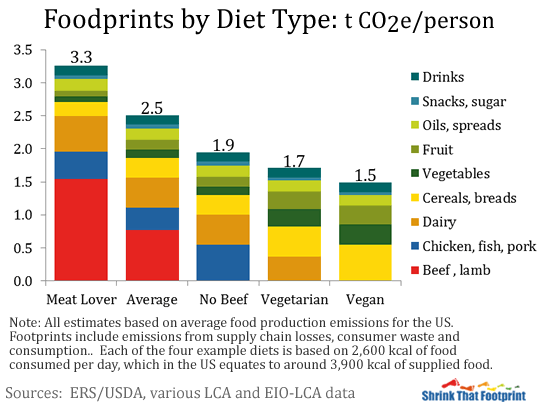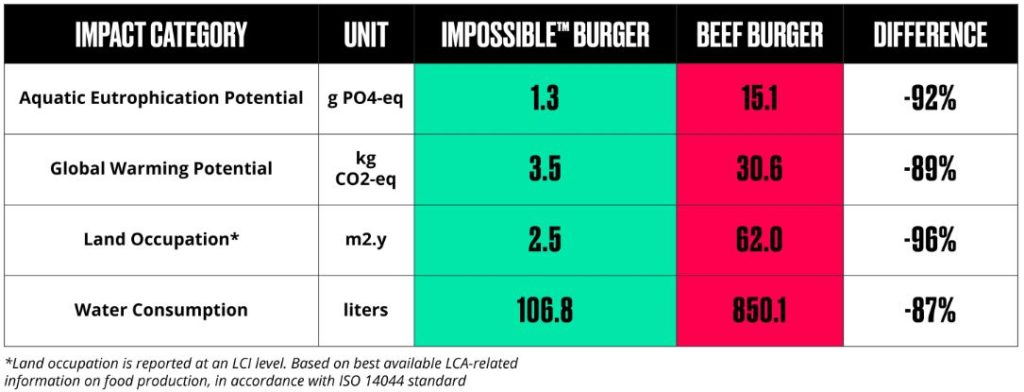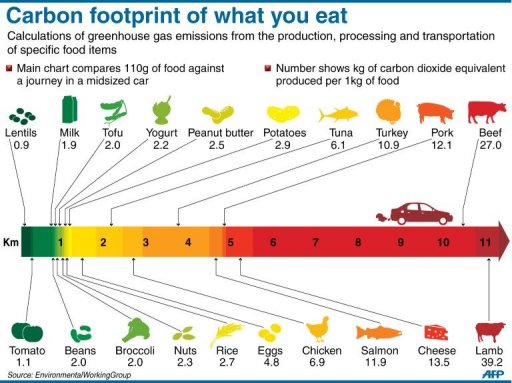Part 3 – Environmental Footprint
When I was in grad school for sustainable business practices, my class traveled to Germany to visit and study large organizations that embodied sustainability. I was excited to go, but I had some concerns about what I would eat while there, expecting a very meat-heavy diet. On the contrary, there were vegetarian options everywhere we went. In fact, I talked about vegetarianism with several German people over the course of the trip, and I was overwhelmed that so many of them had chosen to reduce their meat intake or give it up altogether for the following reason: “I wanted to reduce my carbon footprint.”
Environmental Impacts of Meat
In previous posts on this subject, we looked at the current market trends, which seem to imply that more Americans are reducing their meat intake. It is not clear to me if major food companies serving plant-based alternatives are responding to an increased demand or if they are generating demand as they offer meat alternatives that appear to be the genuine article. I find it hard to believe that Red Robin, Qdoba, Little Caesar’s, White Castle, Burger King, Carl’s Jr, and KFC are all marching down this path simply for the sake of the planet (i.e. without a big payoff in mind), but whatever their reasons, they are touting the environmental benefits of a plant-based diet.
I have seen several reports over the years saying that one of the most impactful things you, as an individual, can do for the environment is to eat less meat. It is true that the beef industry requires a mind-boggling amount of resources in the raising and feeding of cattle, and that reducing meat intake (most specifically beef and lamb) will reduce a major contributor to your own carbon footprint.

From Impossible Foods’ website:
“Dietary choices can meaningfully reduce overall environmental impact. Our current livestock farming system pushes many environmental thresholds past what can be considered sustainable or scalable. Animal farming occupies about half of all vegetated land (at the expense of forests and grasslands that store carbon), uses about one third of all freshwater, contributes about one seventh of global GHGs [greenhouse gases] and generates nutrient pollution (which creates enormous ‘dead zones’ in coastal ecosystems). In the US, beef provides just 3% of our calories but generates half of agricultural greenhouse gases and uses nearly half of the contiguous land area.”[2]
Impossible Foods hired the environmental sustainability consulting group Quantis to examine the resources required and the impacts resulting from creating a beef burger versus an Impossible Burger. In comparing the two, Quantis calculated massive reductions across the board, showing that the land needed for an Impossible Burger is approximately 1/25th (or four percent) of the land needed for a beef burger. Similarly, water consumption required for the Impossible burger is 1/8th of what is required for a beef burger. Impacts are reduced as well: water pollution associated with an Impossible Burger is 1/12th of that for a beef burger; greenhouse gas emissions, 1/9th.
These numbers do not only take into account the feeding and watering of the cows themselves, but also maintaining the massive amounts of land where they live, all of the land and water necessary to grow the food that feeds them for their whole lives, and the fossil fuels needed to transport both food to them and them to slaughter. Cows generate and belch methane, a potent greenhouse gas (equivalent to 25 times the same volume of carbon dioxide). Nitrogen-rich pollutants from agricultural land (think manure) can contribute to eutrophication in waterways, an excess of nutrients that can be dangerous to the ecosystem and cause dead zones or algal blooms.[3] (Based on what I read,it was not clear to me if they were referring to manure created by the cows, used on the food crops for the feed, or some combination of both.)
In short, Impossible Foods’ assertion, backed up by solid research from global organizations, is that switching to a plant-based diet will help reduce environmental impact, limit climate change, and help feed the growing number of people on the planet. If you have the time and interest, there is a link to the full Quantis report at the bottom of the Impossible Foods’ Life Cycle Analysis page.[4] If you have even more time, one of the reports that Quantis referenced is from the World Resources Institute, and it discusses the needs of the planet and methods to successfully feed 10 Billion people by the year 2050.[5]

There’s Always a Catch
Something I try to remind people (including myself) is that just because something is better, that does not mean it is perfect. I believe vegetarianism is a great step toward lowering an individual’s carbon footprint, but it is not a panacea. As with everything, there are drawbacks, tradeoffs, and situations in which it may not be the best option.
One thing that I have difficulty reconciling, as a vegetarian, is how brutal agricultural processes (specifically tilling and harvesting) are for any animals that happen to be living on the land. I won’t go into gruesome detail, but farm machinery is designed to tear up the land for easier planting – and ground-dwelling animals unfortunate enough to be there are torn up with it.
Similarly, the soy industry was called out recently because of all the land being cleared for soy fields in Brazil.[7] In defense of soy, Rebekah Moses, senior manager of impact strategy at Impossible Foods, argued that many of the soy crops being planted in fields that formerly made up part of the Amazon are going to become animal feed, not tofu for vegetarians. (This statement implies that if we reduce our reliance on animal products, the need for this land will drop as well.)[8]
We in America have the luxury of getting our food from around the world. We rarely have to worry about what’s in season, and if we want to eat something that isn’t grown domestically, that isn’t typically a problem for us. However, one of the biggest contributors to the carbon footprint of a food is how far it needs to be transported from where it was grown to where it will be consumed.[9]
In some cases we are even causing harm to people by some of our food choices. For example, our increased demand for quinoa is incenting Bolivian farmers to grow more of that and less of everything else, contributing to soil depletion that comes with mono-cropping, and making it so that they can’t even afford to eat it themselves.[10] Even more brutal are the battles taking place over avocado production in Mexico, which is now seeing involvement from drug cartels because crop supply is scarce and prices are high.[11]

The Right Answer
To reiterate: I am not telling people to become vegetarian, nor am I judging them for eating avocado toast. I am simply illustrating that every decision you make with respect to food has some impact on the planet, its people, and its animals. It does seem that from some perspectives, reducing meat consumption can be a good, cheap, sustainable, and effective way to feed the growing number of people on our planet.
However, I’m not convinced that buying produce from South America is more environmentally friendly than buying pasture-raised beef from a farm down the road. I don’t believe that simply cutting out meat without considering the impacts of the alternatives necessarily has a net-positive result. Furthermore, it doesn’t have to be an all-or-nothing choice, as many “flexitarians” will tell you. More people are eating less meat, while not giving it up entirely. In other words, you have options.
Switching from beef (and lamb) to other sources of meat will still have an impact if you’re not interested in going full vegetarian. Buying local food while it is in season is one of the biggest things you can do to reduce the transportation footprint associated with your food. Making sure you use what you buy instead of throwing it out is also a huge step in the right direction.
Ultimately (as always) the right answer comes down to what works for you and educating yourself about your various choices and their impacts.
Does any of this information about carbon footprint and resource use make you want to switch to plant-based options a few times a week? Is there something else you plan to change even if you don’t want to give up meat? Let me know what you think.
Thanks for reading!
[1] https://carbonfund.org/2013/05/06/live-superfoods-joins-locavore-movement-carbonfree-partnership/
[2] https://impossiblefoods.com/if-pr/LCA-Update-2019/
[3] http://www.coastalwiki.org/wiki/Eutrophication_in_coastal_environments
[4] https://impossiblefoods.com/if-pr/LCA-Update-2019/
[5] https://wriorg.s3.amazonaws.com/s3fs-public/creating-sustainable-food-future_0.pdf?_ga=2.223834008.240648056.1544128399-93678364.1540921129
[6] https://impossiblefoods.com/if-pr/LCA-Update-2019/
[7] https://www.vice.com/en_us/article/bmp4av/meat-may-be-murder-but-tofu-is-too?fbclid=IwAR1ejM1cfeeBqvE93k-9xXhQ3n5SzcWzgw8FIWo3fdHor-jx-7NKah_X5n4
[8] https://www.foodnavigator-usa.com/Article/2019/06/12/Impossible-Foods-unveils-2019-impact-report-Cows-aren-t-getting-any-better-at-making-meat.-We-are
[9] https://www.cnn.com/2017/02/06/health/vegetarian-diet-conversation/index.html?no-st=1567610689
[10] https://www.investopedia.com/articles/investing/083115/quinoa-destroying-bolivias-economy.asp
[11] https://www.newsweek.com/19-people-have-been-murdered-mexico-cartels-fighting-over-avocado-trade-1453925
[12] http://sustainability.tamu.edu/why-4-d.aspx
2 Comments
frenchc1955 · September 14, 2019 at 11:11 pm
Hello!!!! How are you doing? It has been way too long.
Alison · September 16, 2019 at 1:15 pm
Hi Chuck! Doing well, thanks!
Thank you for checking out my blog 😀